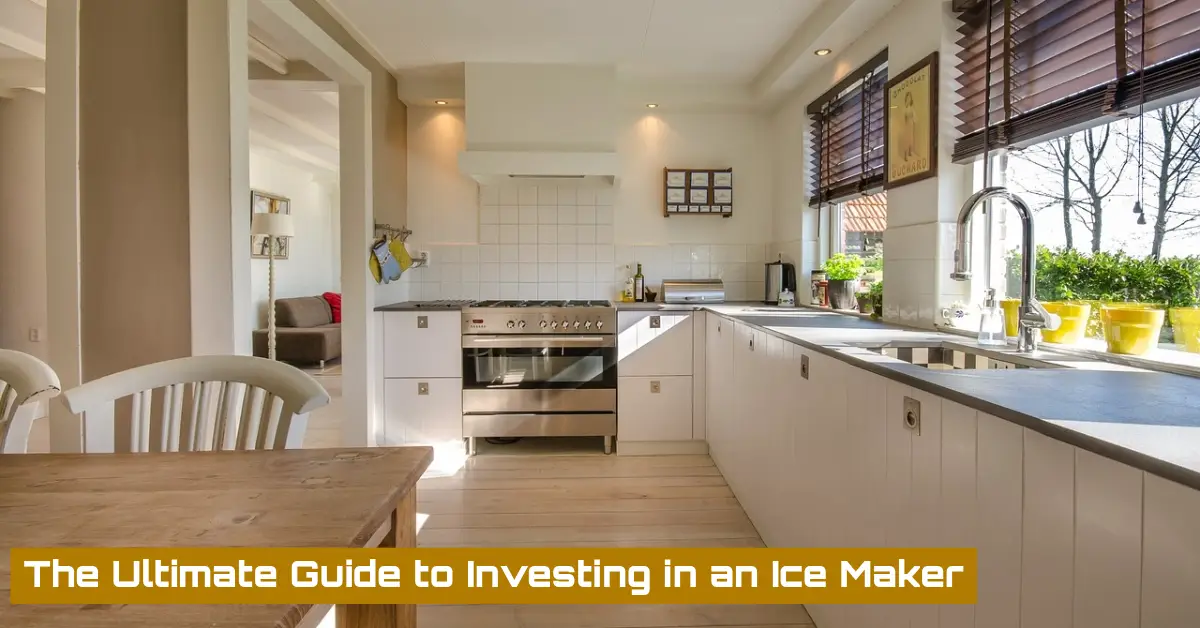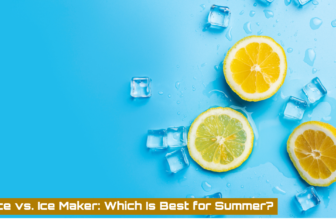
Contents
Introduction
In today’s fast-paced world, convenience and efficiency are paramount. One appliance that has gained popularity for its ability to provide these benefits is the ice maker. Whether you’re a frequent entertainer, a beverage enthusiast, or someone who enjoys the luxury of having ice readily available, an ice maker can be a valuable addition to your home. But is it a worthy investment? This blog post will explore the various aspects of owning an ice maker, helping you decide if it’s the right choice for you.
Understanding Ice Makers
Before diving into the benefits and considerations of owning an ice maker, it’s important to understand the different types available. Each type caters to different needs and preferences, making it essential to choose the one that best suits your lifestyle.
Types of Ice Makers
Portable Ice Makers
Portable ice makers are compact and easy to transport. They don’t require installation and are perfect for small spaces, RVs, dorm rooms, and outdoor events.
- Pros:
- No installation required
- Quick ice production (within 10-20 minutes)
- Easy to transport
- Cons:
- Limited ice storage
- Ice may start to melt if not used promptly
Countertop Ice Makers
Countertop ice makers are designed to sit on your kitchen counter. They are slightly larger than portable models and often come with additional features like different ice sizes and self-cleaning functions.
- Pros:
- Convenient access
- Produces ice quickly
- May include features like self-cleaning and different ice sizes
- Cons:
- Takes up counter space
- Higher energy consumption than portable models
Under-Counter Ice Makers
Under-counter ice makers are built into your kitchen cabinetry and require professional installation. They offer high ice production and storage capacities, making them suitable for larger households or those who entertain frequently.
- Pros:
- Seamless kitchen integration
- High production capacity
- Produces high-quality, clear ice
- Cons:
- Higher initial cost
- Requires proper installation and ventilation
Commercial Ice Makers
Commercial ice makers are designed for heavy-duty use in restaurants, bars, and hotels. However, they can also be suitable for homes with very high ice needs.
- Pros:
- Extremely high production capacity
- Durable and long-lasting
- Advanced features like water filtration
- Cons:
- Expensive and space-consuming
- Higher energy and water consumption
Benefits of Owning an Ice Maker
Convenience
One of the most significant benefits of an ice maker is the convenience it offers. With an ice maker, you can have a steady supply of ice without the hassle of filling and waiting for ice trays to freeze.
- Quick Ice Production: Most ice makers can produce ice within 10-20 minutes.
- Continuous Supply: High-capacity models can produce up to 50 pounds of ice per day, ensuring you never run out.
Improved Ice Quality
Ice makers often produce better-quality ice than traditional ice trays. Many models come with filtration systems that ensure the water used is clean and free of impurities.
- Better Taste: Filtered water results in ice that won’t alter the flavor of your drinks.
- Clarity: Ice from an ice maker is often clearer due to faster freezing, which traps fewer air bubbles.
Variety of Ice Types
Modern ice makers offer different types of ice to suit various needs, from cooling drinks to making cocktails.
- Cube Ice: Standard ice for most beverages.
- Nugget Ice: Soft and chewable, great for soft drinks and cocktails.
- Gourmet Ice: Large, clear cubes that melt slowly, ideal for high-end drinks.
Cost Considerations
Investing in an ice maker involves both initial and ongoing costs. It’s crucial to weigh these costs against the benefits to determine if it’s a sound investment for your home.
Purchase Price
The cost of ice makers varies widely based on their type and features.
- Portable Ice Makers: Typically range from $100 to $300.
- Countertop Ice Makers: Generally cost between $150 and $500.
- Under-Counter Ice Makers: Can range from $500 to $2,500 or more.
- Commercial Ice Makers: Start around $1,000 and can exceed $5,000.
Operational Costs
Beyond the initial purchase, you’ll need to consider the costs of running an ice maker, including energy consumption, water usage, and maintenance.
- Energy Consumption: Ice makers use electricity to produce ice, so choosing an energy-efficient model can help reduce this cost.
- Water Usage: Some models are more water-efficient than others, which can impact your water bill.
- Maintenance: Regular cleaning and occasional part replacements are necessary to keep your ice maker running smoothly.
Environmental Impact
While ice makers offer numerous benefits, they also have an environmental footprint. Here are some factors to consider:
Energy Efficiency
Look for models with an Energy Star rating, which indicates they meet energy efficiency guidelines set by the U.S. Environmental Protection Agency (EPA).
Water Efficiency
Some ice makers recycle melted ice water, reducing overall water consumption. This feature can help minimize your environmental impact.
Refrigerants
Check the type of refrigerant used in the ice maker. Eco-friendly refrigerants have a lower environmental impact.
Maintenance and Longevity
Proper maintenance is essential to ensure your ice maker operates efficiently and has a long lifespan.
Regular Cleaning
Ice makers need to be cleaned regularly to prevent the buildup of mineral deposits, mold, and bacteria.
- Self-Cleaning Models: These automate the cleaning process, making maintenance easier.
- Manual Cleaning: If your model doesn’t have a self-cleaning feature, you’ll need to clean it manually. This usually involves running a mixture of water and vinegar through the machine and scrubbing any removable parts.
Filter Replacement
If your ice maker has a water filter, it will need to be replaced periodically. Follow the manufacturer’s guidelines for the recommended replacement schedule.
Inspecting and Replacing Parts
Occasionally, parts like the water line or ice scoop may need to be inspected and replaced to ensure the ice maker runs smoothly.
Choosing the Right Ice Maker for Your Home
Selecting the right ice maker involves assessing your needs, space, and budget.
Determine Your Ice Needs
Consider how much ice you typically use. If you frequently host parties or have a large family, you may need a higher-capacity ice maker.
Evaluate Your Space
Ensure you have enough space for the ice maker. Measure the area where you plan to install or place it to ensure it fits comfortably.
Set a Budget
Determine how much you’re willing to spend. Factor in both the initial cost and ongoing operational costs.
Research Features
Look for features that meet your needs, such as:
- Self-Cleaning: Simplifies maintenance.
- Timer Functions: Allows you to schedule ice production.
- Multiple Ice Sizes: Offers versatility for different uses.
Read Reviews
Customer reviews can provide valuable insights into the reliability and performance of different ice makers. Look for models with high ratings and positive feedback.
Pros and Cons of Investing in an Ice Maker
Pros:
- Convenience: Instant access to ice without the hassle of trays.
- Quality: Clearer, better-tasting ice.
- Variety: Different types of ice for various uses.
- Time-Saving: Reduces the time spent filling and freezing ice trays.
- Hygiene: Cleaner ice with less risk of contamination.
Cons:
- Cost: Initial investment and ongoing operational costs.
- Maintenance: Regular cleaning and occasional part replacements.
- Space: Requires dedicated space in your kitchen or home.
- Energy Consumption: Adds to your electricity bill.
Conclusion
Investing in an ice maker can significantly enhance your kitchen experience, offering convenience, consistent ice quality, and time-saving benefits. While the initial cost and ongoing maintenance are important considerations, the advantages often outweigh these factors, especially for those who entertain frequently or enjoy cold beverages regularly. By assessing your needs, space, and budget, and researching different models and features, you can find the perfect ice maker for your home. Ultimately, having a reliable source of ice can make your home more inviting and your life a little easier.
This comprehensive guide aims to provide all the necessary information to help you decide whether an ice maker is a worthy investment for your home. With careful consideration and proper research, you can enjoy the many benefits that an ice maker has to offer.








